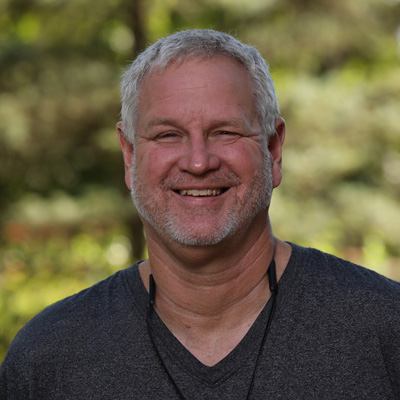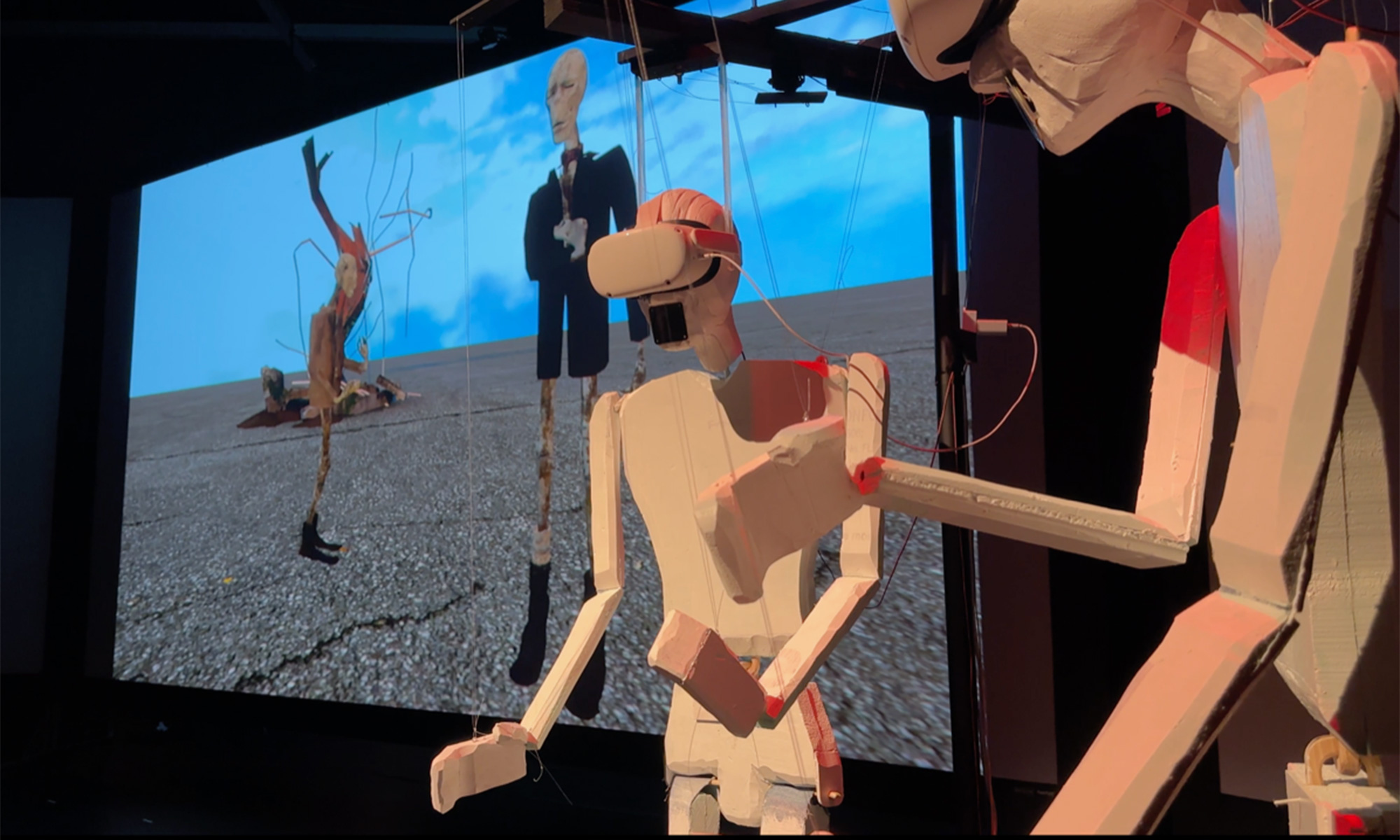The onset of the global pandemic changed how the world conducted business. While some could work remotely with little complication, others, like assistant professor of theatre James Dennen, needed to adopt a more creative approach.
Actors and directors must interact in the same shared and intimate space for a production to flourish. The theatre director tried staging rehearsals with actors spread out across the country on a teleconference but found the experience unproductive.
Searching for an innovative solution, Dennen’s longtime collaborator and fellow Denison faculty member, Christian Faur, offered a bold alternative: Why not hold rehearsals in virtual reality?
Faur’s official title is director of collaborative technologies for the fine arts. Others know him as the Leonardo da Vinci of Denison, a Renaissance man with a background in physics, an uncanny understanding of technology, and an ability to make art out of crayons.
Faur and Dennen worked together to construct a virtual environment that accommodated the spatial requirements necessary for a rehearsal.
“One of my own projects in the theatre has always been to explore what can actually happen between people in the same room, and so it almost felt opposed to my company’s mission,” Dennen recalled. “But once we got used to the headsets, we were stunned at what we could accomplish. It felt like we were all in the same space. We liked it so much and saw so much creative potential that we built a show in virtual reality.”
His production of Marriage: a Work in Progress landed him a residency at the Wexner Center for the Arts at the Ohio State University to build digital works. Dennen and Faur are collaborating again with Like Leaves. Like Carrots., a contemporary performance at the Wex on Jan. 12 and 13.
Once again, Dennen is pushing the bounds, blending traditional theatre and technology for audiences who can watch it at the Wex or in virtual reality.
Viewers will be treated to puppetry, robotics, spoken-word storytelling, choreography, and a string quartet. There will be six-foot-tall marionettes wearing VR headsets on stage and an improvisational performance that includes dialogue generated from artificial intelligence.
“I’m super happy to work with faculty who are willing to take risks,” Faur said. “We are lucky to have someone like Jim on our faculty.”
As the pandemic’s grip loosened and workers returned to their places of business, Dennen easily could have slid back into his familiar environs. But the assistant professor embodies the spirit of Denison, always moving forward and eager to plant flags in new frontiers.
“I’ve stumbled into something that is necessary,” said Dennen, who continues to co-produce HERE US, a Denison theatre department production by students of color who create original content through spoken word, music, dance, and digital arts. “I don’t know if I will ever stop doing my other work, but I certainly will keep working with new technologies as long as there is a means to do it.”
Dennen serves as director, and Faur as the visual artist of Like Leaves. Like Carrots., which features writer and spoken-word artist Michael “Blakk Sun” Powell, dancer and choreographer Brianna Rhodes, and the string quartet ETHEL.
The production is a response to Samuel Beckett’s absurdist tragicomedy Waiting for Godot.
Theatre fans familiar with Godot will recognize characters Lucky, Vladimir, and Estragon — though in Dennen’s production, Vladimir and Estragon appear as marionettes powered by robotics and AI. Lucky, a bit character in Beckett’s play, evolves into the central character in Like Leaves. Like Carrots.
In Godot, Lucky delivers a monologue Dennen interpreted as “one run-on sentence that feels like all the goo of Western culture.”
“Lucky is on a leash,” Dennen said. “He’s an enslaved character who keeps threatening to make sense but never does.”
In Like Leaves. Like Carrots., Powell developed the AI model for Lucky, taking a million words of text from critical race theory, Black history, and rap to create the character’s dialogue.
“That becomes our Lucky 2.0,” Dennen said.
Powell and Rhodes perform on stage, and the combination of their words and movements brings Lucky to life as an avatar appearing on a giant screen.
“For me, the challenge is how do you work with this remarkable technology that’s been made available to us,” Dennen said. “It’s a show driven by human interest, but we’re adding AI to this shared virtual space, and that’s pretty darn new.”







